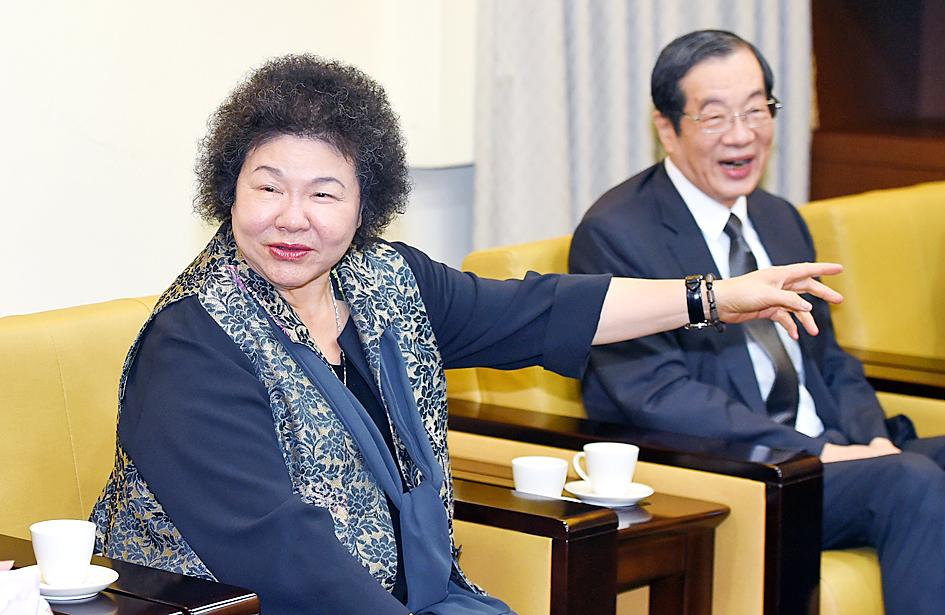Previous Judicial Yuan cases related to human rights would be incorporated into civil servant training courses to help them better understand that human rights transcend political differences, Control Yuan President Chen Chu (陳菊) told a news conference yesterday.
The project is a collaborative effort between the Control Yuan’s National Human Rights Committee and the Examination Yuan’s National Academy of Civil Service.
Chen said that she was glad to see interdepartmental collaboration on the issue of human rights, adding that this was a very important step forward.

.Photo: Liao Chen-huei, Taipei Times
No one in Taiwan knew what human rights were five decades ago, and for the past five decades, she and others have been working hard to bring the most basic human rights to Taiwanese, Chen said.
Civil servants should be above partisan politics and should dedicate themselves to the advancement of society, similar to some other countries in which civil servants, no matter which political party they belong to, always work for the people, Chen said.
If during their training, civil servants learn the importance of human rights, understand that such concepts transcend politics, and respect, empathize and care for one another, they can better help those who are disadvantaged, she said.
The next step would be to collaborate with the Ministry of Education to train teachers and deans to help students nationwide understand the concept of human rights, Chen said.
Examination Yuan President Huang Jong-tsun (黃榮村) told the news conference that civil servants are the core that makes the government stable.
Civil servants should be apolitical and should take pride in it, Huang said.
To meet President Tsai Ing-wen’s (蔡英文) expectations for the Examination Yuan to transition into a “human resource department” for the government, the Examination Yuan cannot afford to be absent at an event in which the importance of human rights is emphasized, Huang said.
Academy President Hao Pei-chih (郝培芝) said that Judicial Yuan cases are the best examples of theoretical and practical human rights, and would serve as excellent teaching materials for future civil servants.
Hao said she hoped that all civil servants would continue to reflect on the greater meaning of these materials.

AGING: As of last month, people aged 65 or older accounted for 20.06 percent of the total population and the number of couples who got married fell by 18,685 from 2024 Taiwan has surpassed South Korea as the country least willing to have children, with an annual crude birthrate of 4.62 per 1,000 people, Ministry of the Interior data showed yesterday. The nation was previously ranked the second-lowest country in terms of total fertility rate, or the average number of children a woman has in her lifetime. However, South Korea’s fertility rate began to recover from 2023, with total fertility rate rising from 0.72 and estimated to reach 0.82 to 0.85 by last year, and the crude birthrate projected at 6.7 per 1,000 people. Japan’s crude birthrate was projected to fall below six,

Conflict with Taiwan could leave China with “massive economic disruption, catastrophic military losses, significant social unrest, and devastating sanctions,” a US think tank said in a report released on Monday. The German Marshall Fund released a report titled If China Attacks Taiwan: The Consequences for China of “Minor Conflict” and “Major War” Scenarios. The report details the “massive” economic, military, social and international costs to China in the event of a minor conflict or major war with Taiwan, estimating that the Chinese People’s Liberation Army (PLA) could sustain losses of more than half of its active-duty ground forces, including 100,000 troops. Understanding Chinese

US President Donald Trump in an interview with the New York Times published on Thursday said that “it’s up to” Chinese President Xi Jinping (習近平) what China does on Taiwan, but that he would be “very unhappy” with a change in the “status quo.” “He [Xi] considers it to be a part of China, and that’s up to him what he’s going to be doing, but I’ve expressed to him that I would be very unhappy if he did that, and I don’t think he’ll do that. I hope he doesn’t do that,” Trump said. Trump made the comments in the context

SELF-DEFENSE: Tokyo has accelerated its spending goal and its defense minister said the nation needs to discuss whether it should develop nuclear-powered submarines China is ramping up objections to what it sees as Japan’s desire to acquire nuclear weapons, despite Tokyo’s longstanding renunciation of such arms, deepening another fissure in the two neighbors’ increasingly tense ties. In what appears to be a concerted effort, China’s foreign and defense ministries issued statements on Thursday condemning alleged remilitarism efforts by Tokyo. The remarks came as two of the country’s top think tanks jointly issued a 29-page report framing actions by “right-wing forces” in Japan as posing a “serious threat” to world peace. While that report did not define “right-wing forces,” the Chinese Ministry of Foreign Affairs was